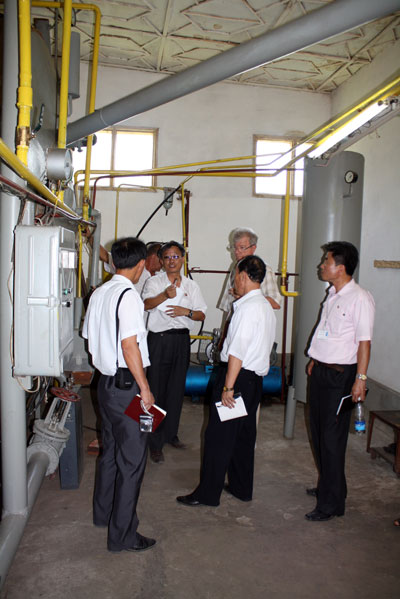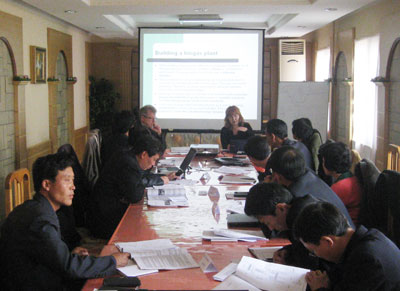The idea of exchanging experience with Democratic People’s Republic of Korea has been born during the study tour on Sustainable Energy Systems in Kyrgyzstan in August 2011, when DPRK delegation has visited 4 biogas plants constructed and supported by PF “Fluid” and was introduced to practical experience acquired by PF “Fluid” in implementation and development of the biogas technology in rural areas of the Kyrgyz Republic.

DPRK delegation during visit to KR in August 2011 on biogas plant in Tokmok city, KR
However, the specialists of the PF “Fluid” did not have the opportunity to provide the team with practical recommendations and complete technical information that would increase the potential of successful implementation of biogas technologies in the DPRK due to limited knowledge of the local conditions and technical capacity of DPRK.
Therefore, specialists of the PF “Fluid” have made a proposal to UNDP DPRK on experience exchange tour with the following scope of work:
1. To obtain a broader understanding of financial, institutional, technical, economic, social and environmental aspects of biogas technologies development in rural areas of DPRK through visiting several existing biogas plants and organizations producing materials and equipment for biogas plants, meeting responsible government officials;
2. To support development of biogas technologies in DPRK through developing recommendations for practical implementation of biogas technologies in the DPRK for farm and household biogas plants planned to be installed on 4 SRED project sites, including optimal construction of the biogas plants, technical specifications and standards of biogas plant construction and operation, developing government program of dissemination of biogas technologies;
3. To build the capacity of stakeholders in DPRK through development of the training module and educational materials for local experts and conducting practical training of trainers (ToT) on construction, equipment and materials for producing biogas plants, operation and maintenance of biogas plants, using biogas and biofertilizer.
During PF Fluid experience exchange tour to DPRK PF Fluid specialists Aleksei Vedenev and Tatiana Vedeneva:
• visited one 80 m3 biogas plant at Kyenam stock farm and received information about household biogas plants implemented in DPRK;
• visited project sites at Myongchon-ri and Mopung-ri and assessed existing conditions for constructing and operating biogas plants in these 2 sites;
• provided 3-day practical training of trainers (ToT) on construction, equipment and materials for producing biogas plants, operation and maintenance of biogas plants, using biogas and biofertilizer in Pyongyang for 18 participants from SAOS (State Academy of Science) and other relevant institutions;

Discussion of biogas plant constructions during 3-day training in Pyongyang, DPRK, November 2011
• received and assessed materials of the project including Feasibility studies of the 4 project sites, developed by Full Advantage Company Ltd from Thailand and design of the farm and household biogas plants planned to be installed on 4 project sites;
• developed draft recommendations for implementing biogas technology part of SRED Project and discussed them with local specialists, project management and other stakeholders;
• handed over teaching module and presentations for future use to train local stakeholders (farmers, cooperatives, etc), together with technical specifications and optimal design of the biogas plants for DPRK and operation manual adapted to DPRK conditions in English;
Existing feasibility study prepared by Thailand experts suggests constructing concrete farm and household biogas plants with no agitation and no heating system, assuming mesophilic (37°C) semi-continuous mode digestion of mixed straw, manure and other available wastes biogas inside of the greenhouse.
However, provided in the feasibility study average yearly temperature of approximately 10°C does not allow for operation of the farm plant without heating system in mesophilic regime of 37°C.
All-year operation in psychophilic regime of 22-25°C can be only be ensured conditional on either heating of the plant or ensuring constant minimum temperature of 20°C in the greenhouse, but mesophilic regime requires installing a heating system in biogas plant.
Planned feedstock composition for farm biogas plants will lead to necessity of constructing larger biogas plants with less than optimal biogas production rates. For example, a 100 m3 digester plant operating on manure with straw and other vegetable wastes (according to schedule suggested in the feasibility study: loading 25 tons of straw at 3-month intervals and 0,4-0,8 tons of manure daily) will be able to provide daily biogas yield of 30-60 m3. However, a 100 m3 steel digester of suggested by PF Fluid design, operating on pure manure will be able to digest up to 6 tons per day in mesophilic regime and produce 200-300 m3 of biogas.
Considering availability of feedstock (1 ton with possibility of increasing up to 3 ton), it would be enough to install a 50 m3 biogas plants of optimal construction working on pure manure, which can digest up to 3 tons of manure daily and produce up to 100-150 m3.
Also, suggested by Thailand experts household and farm-plant design does not allow sufficient control of the digestion process for optimal production of biogas and biofertilizer and does not take into account usability of the plant. For example, the provided designs do not foresee an agitation system of the digested feedstock, and regular agitation is one of the key elements to optimal operation of biogas plants.
PF Fluid has adapted one of the feasibility reports for Mopung cooperative farm to optimize offered solution on individual and farm biogas plants.
In developing recommendations for household and farm biogas plants to be implemented in DPRK, PF Fluid has been taking into account received information and own 10-year experience of PF Fluid in constructing and operating biogas plants and implementation biogas technologies. Implementing less than optimal or deficient designs can have strong negative influence on the possibility of dissemination of the technology within the DPRK, as the technology will then have a bad reputation, which will be very difficult to overcome.
Recommendations for household plants
Apart from the necessity of installing agitation system, there’s again the issue of the operating temperature. All-year operation of the plant in psychophilic regime of 22-25°C can only be ensured conditional on either heating of the plant or ensuring constant minimal temperature of 20°C in the greenhouse, where plant is to be constructed.
First suggestion of PF Fluid would be to install a heating system (using biogas or local fuels such as straw) in the biogas plant that would allow for psychophilic or mesophilic mode of operation of the plant.
However, local specialists have informed PF Fluid that there is no
access to fuels in the pilot villages, and that there are cases of successful operation of biogas plants in greenhouses in DPRK.
However, as PF Fluid have not seen a successful implementation of unheated biogas plant the greenhouse, either in DPRK or in Kyrgyzstan which has similar climatic conditions, PF Fluid would recommend initially decreasing the number of planned household biogas plants to 5 pilot ones, instead of constructing 10-20 plants on each project site, and adding manual agitation system, as discussed with local expert Prof. Kim.
After construction of the 5 pilot household plants PF Fluid would recommend monitoring capacity of greenhouse construction to hold minimal temperature of 20°C and capacity of local population for successful operation of the plant for at least a year. Final decision about larger-scale implementation of household biogas plants should be than based on results of monitoring.
Recommendations for farm plants
Taking into account shortcomings in the design suggested by the feasibility study and received from local experts, PF Fluid recommends complete reconsideration of the design of the farm biogas plant and inclusion of additional equipment to allow better control for optimal production of biogas and biofertilizer in DPRK conditions. This reconsideration would mean adaptation of a more optimal and efficient technology of digesting manure.
Biogas plants for 4 project farms should have digester volume of 50 m3 and have the capacity to work under “continuous work cycle”, digesting in mesophilic regime up to 3 tons of feedstock per day and producing up to 150 m3 biogas per day. Regime of preparation, loading of the fresh feedstock, agitation and unloading of the digested feedstock in the storage tank or automobile/tractor transport should be semi-automatic, regime of gas collection – automatic. Digester must be equipped with feedstock heating system, which should include water boiler working on produced biogas. Additionally heating system should include separate or combined water boiler working on hard fuel or electricity to be used during the commissioning of the biogas plant.
To increase the daily load of the biogas plants up to their optimal capacity PF Fluid would recommend discussing with the cooperatives a possibility of organizing community work on collection of feedstock from neighboring individual households for optimal operation of equipment.
Considering insufficient practical experience of local experts in such technologies, as well as on constructing and operating biogas plants using that technology, PF Fluid recommends ordering a turn-key delivery of the first demonstrational biogas plant of optimal construction, that would include heating and agitation devices from experienced manufacturers outside DPRK.
The manufacturer should also be asked to organize practical hands-on training during assembly, commissioning and operation of the plant for local experts, so that they would then be able to successfully replicate the technology in other project sites using local materials and equipment.
Recommendations on policy support
PF Fluid also recommends supporting development of DPRK state biogas program based on imported and locally adapted technical and design information, considering obstacles for receiving of information about technologies existing in other countries. Based on the experience on biogas promotion in Kyrgyzstan it is also important to highlight the following issues that might be also suitable to consider in DPRK as well:
• Absence of legislative and institutional framework that should regulate utilization of organic wastes and feed-in tariffs, etc;
• Absence of government supported biogas technologies development program (ex: subsidies reach 50-80% in Asian countries, etc.);
• Insufficient information available on biogas technology to potential users and weak understanding of economic and environmental benefits by rural population;
• Insufficient quantity and operational quality of demonstrated biogas equipments (technical standards not developed or enforced);
• Absence of accessible financial and credit mechanisms for rural population.
